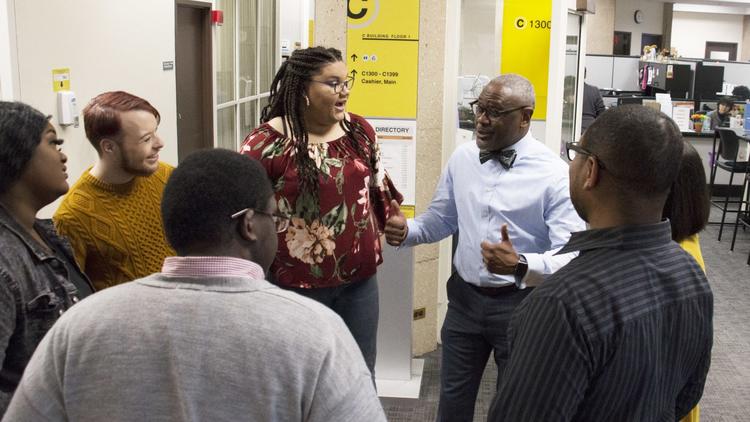As a Brooklyn College student in the 1980s, concerns about racial unrest and inequities prompted Corey Williams, who is black, to join a fraternity that was predominantly white.
The Zeta Beta Tau Fraternity alumnus said his goal was to help dismantle stereotypes and foster understanding at the New York City school.
Today, Williams said he is continuing a similar mission. Williams, who since developed mentoring programs targeting minority first-generation students at several colleges, was recently named the chief diversity officer at Governors State University in University Park, a first for the school.
“Rather than being on the sidelines viewing equity issues, we thought why not tackle equity issues within our own institution and be a model for other institutions across the state,” said Williams, 48, who also serves as GSU’s associate vice president for student affairs and dean of students.
Williams, who has a master’s degree in higher education from Chicago State University, has nearly two decades of experience working in leadership and administration in higher education positions, including at Triton College in River Grove, where he served as dean of student services and Title IX coordinator. There he founded and implemented Triton Men Pursuing Higher Education, a multifaceted mentoring program that aided in the recruitment, retention and graduation of minority males, he said.
Communication is key to fostering a culture of respect and understanding, he said. Williams, who at age 9 emigrated from Panama to New York with his mother, has long held that belief.
That’s what prompted him to join Zeta Beta Tau, a predominantly Jewish and white fraternity while he attended Brooklyn College. His decision to do so followed the high-profile death in 1986 in New York of Michael Griffith, a 23-year-old New York City resident, who died after being struck by a car as he fled a mob of angry white teens. That experience and other racial tensions had a profound effect on Williams, who recalled racial tensions were high in the city and at the college.
“For me it was difficult to understand why something as simple as the color of a person’s skin would create barriers from getting people to truly know one another,” he said.
“It was something I couldn’t get. As a child in central and south America, what I saw as an issue was more classism as opposed to racism, so this was very vexing to me, something I wanted to understand better, to create conversations to bring about understanding.”
So, he decided to join Zeta Beta Tau, he said. Chapter members spent time with his family and in his home, and he spent time with theirs. He later became chapter president, he said.
“I learned a lot about the Jewish faith, and I was able to dismantle some preconceived notions that people may have had about black men,” he said.
In order to dismantle stereotypes and foster and maintain a culture of respect at GSU, it’s important to have “honest conversations, courageous conversations and safe conversations, to not hold things back but discuss things in a productive way, to create that safe space for people to seek understanding,” he said.





















